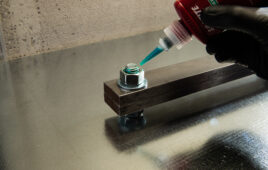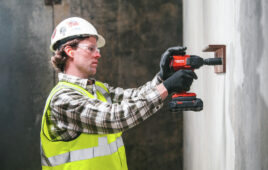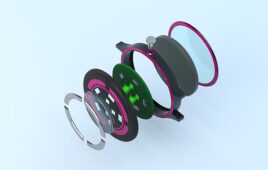DELO, a global manufacturer of industrial adhesives for automotive, consumer, and industrial electronics applications, now offers a structural adhesive for batteries used in hybrid vehicles. Designed for high-volume series production, DELO-DUOPOX TC8686 is thermally conductive and flame-retardant.

DELO-DUOPOX TC8686 is classified in transport category 1. The adhesive is easy to transport and can be safely stored at room temperature.
This new adhesive is suitable for low-voltage batteries found in mild hybrid and conventional hybrid vehicles, as well as in e-bikes and e-scooters. In fact, one automotive supplier is already using this product in the ramp-up phase of production.
DELO-DUOPOX TC8686 allows battery cells to bond with a battery’s housing while dissipating the heat generated during operation. Instead of mechanically connecting the battery cells and then using gap fillers for heat dissipation, the adhesive combines connection of the thermal management system and structural bonding into one step, simplifying production.
Optimized for batteries
DELO-DUOPOX TC8686 is designed for temperatures ranging from -40° to +85° C and offers good strength on battery cells and typical housing materials. The tensile shear strength of the adhesive on aluminum is 18 N/mm² and meets the strength requirements of the automotive industry at typical operating temperatures ranging from 10° to 40° C, as well as at maximum service temperatures of 80° C.
Temperatures beyond this can result in irreversible damage to the battery electrolyte. The adhesive’s elongation at tear also helps to meet these requirements. A certain flexibility compensates for the different thermal expansion behaviors of cell and housing material during operation.
The adhesive has a thermal conductivity of 1.1 W/m*K. It also meets the requirements for flame retardancy according to UL 94 V-0.
High-volume production
DELO-DUOPOX TC8686 has been optimized for manufacturing processes. It offers a simple mixing ratio of 2:1 and has a processing time of approximately 30 minutes after mixing. This is long enough for prototypes and small series and fast enough for fully automated systems.
After four hours, the adhesive reaches its initial strength. Ninety percent of its final strength can be achieved after 24 hours. Even with low heat input, this amount of time can be reduced significantly. Depending on the battery electrolyte used, a curing temperature of 60° C can help to speed up assembly.
Beige in color, the product is easily detectable by cameras, ensuring accurate application control. In addition, the filler for thermal conductivity is only slightly abrasive, contributing to the dispensing systems’ long lifespan.







Tell Us What You Think!